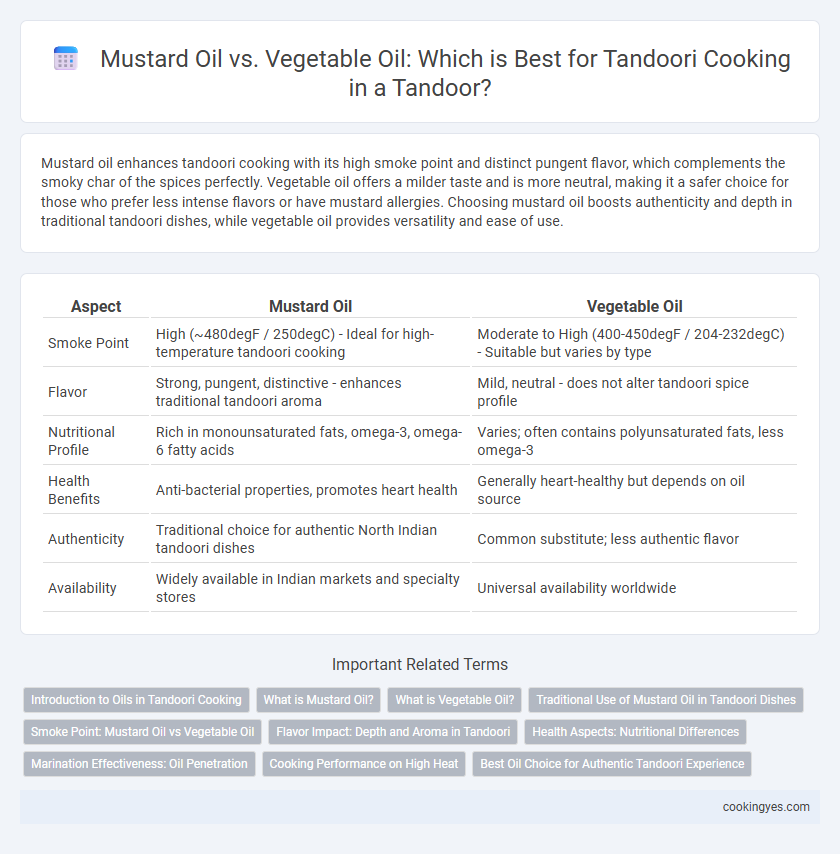Mustard oil enhances tandoori cooking with its high smoke point and distinct pungent flavor, which complements the smoky char of the spices perfectly. Vegetable oil offers a milder taste and is more neutral, making it a safer choice for those who prefer less intense flavors or have mustard allergies. Choosing mustard oil boosts authenticity and depth in traditional tandoori dishes, while vegetable oil provides versatility and ease of use.
Table of Comparison
| Aspect | Mustard Oil | Vegetable Oil |
|---|---|---|
| Smoke Point | High (~480degF / 250degC) - Ideal for high-temperature tandoori cooking | Moderate to High (400-450degF / 204-232degC) - Suitable but varies by type |
| Flavor | Strong, pungent, distinctive - enhances traditional tandoori aroma | Mild, neutral - does not alter tandoori spice profile |
| Nutritional Profile | Rich in monounsaturated fats, omega-3, omega-6 fatty acids | Varies; often contains polyunsaturated fats, less omega-3 |
| Health Benefits | Anti-bacterial properties, promotes heart health | Generally heart-healthy but depends on oil source |
| Authenticity | Traditional choice for authentic North Indian tandoori dishes | Common substitute; less authentic flavor |
| Availability | Widely available in Indian markets and specialty stores | Universal availability worldwide |
Introduction to Oils in Tandoori Cooking
Mustard oil and vegetable oil differ significantly in flavor and smoke point, impacting tandoori cooking outcomes. Mustard oil imparts a pungent, bold aroma and high smoke point, ideal for marinating and grilling traditional tandoori dishes. Vegetable oil offers a neutral taste and moderate smoke point, better suited for mild-flavored or less intense tandoori recipes.
What is Mustard Oil?
Mustard oil, extracted from mustard seeds, is a pungent and flavorful oil widely used in Indian cuisine, especially for tandoori cooking. Its high smoke point and distinctive aroma enhance the charred, smoky flavor characteristic of tandoori dishes. Unlike neutral vegetable oils, mustard oil adds a spicy undertone and acts as a natural preservative, making it ideal for marinating meats and vegetables before grilling.
What is Vegetable Oil?
Vegetable oil is a neutral-flavored oil extracted from various plant sources such as soybeans, sunflower seeds, and corn, commonly used for cooking including tandoori dishes. It has a high smoke point, making it suitable for the high temperatures of tandoori cooking without imparting strong flavors. Compared to mustard oil, vegetable oil offers a milder taste, allowing the spices and marinade in tandoori recipes to stand out.
Traditional Use of Mustard Oil in Tandoori Dishes
Mustard oil is traditionally favored in tandoori cooking for its pungent flavor and high smoke point, which enhances the authentic taste of tandoori dishes. Its naturally occurring antioxidants and antimicrobial properties contribute to the preservation and rich aroma of marinated meats and vegetables. Vegetable oil, while milder and more neutral, lacks the distinct sharpness and historical significance that mustard oil imparts to traditional tandoori recipes.
Smoke Point: Mustard Oil vs Vegetable Oil
Mustard oil has a high smoke point of around 480degF (249degC), making it ideal for tandoori cooking where intense heat is essential for authentic flavor and texture. In contrast, common vegetable oils typically have lower smoke points, ranging from 350degF to 450degF (177degC to 232degC), which may result in premature burning and a less desirable taste. Choosing mustard oil ensures better heat tolerance and a distinct pungent aroma that enhances traditional tandoori dishes.
Flavor Impact: Depth and Aroma in Tandoori
Mustard oil imparts a bold, pungent aroma and a slightly spicy depth to tandoori dishes, enhancing the traditional smoky flavors with its distinctive sharpness. Vegetable oil offers a milder, neutral taste that allows the tandoori spices and marination to shine without overpowering the palate. Chefs often prefer mustard oil for its ability to deepen the flavor profile and add authentic intensity to tandoori cooking.
Health Aspects: Nutritional Differences
Mustard oil contains high levels of monounsaturated and polyunsaturated fats, including omega-3 and omega-6 fatty acids, which support heart health and reduce inflammation. Vegetable oil, often soybean or sunflower-based, typically has a higher proportion of omega-6 fatty acids that can promote inflammation if consumed excessively. The balance of fatty acids in mustard oil makes it a healthier option for tandoori cooking by enhancing flavor while providing beneficial nutrients and antioxidants.
Marination Effectiveness: Oil Penetration
Mustard oil's smaller molecular size and higher smoke point enhance marination effectiveness by allowing deeper oil penetration into the meat, enriching flavor and tenderness in tandoori dishes. Vegetable oil, typically with a neutral taste and larger molecular structure, tends to form a surface layer, limiting marinade absorption and reducing the depth of flavor infusion. The use of mustard oil accelerates spice and seasoning integration during marination, resulting in more robust and authentic tandoori flavors.
Cooking Performance on High Heat
Mustard oil excels in tandoori cooking due to its high smoke point of around 480degF, allowing it to withstand intense heat without breaking down or producing harmful compounds. Vegetable oils, such as canola or sunflower, though commonly used, generally have lower smoke points ranging from 400degF to 450degF, making them less ideal for sustaining the traditional high-temperature environment of a tandoor. The robust flavor profile of mustard oil also enhances the authenticity and depth of tandoori dishes, creating a superior cooking performance when exposed to extreme heat.
Best Oil Choice for Authentic Tandoori Experience
Mustard oil is the best oil choice for an authentic tandoori experience due to its high smoke point and distinctive pungent flavor, which enhances the traditional smoky aroma of tandoori dishes. Vegetable oil, while milder and more neutral, lacks the characteristic depth and heat profile needed to replicate genuine tandoori cooking methods. Using mustard oil not only preserves the original taste but also ensures optimal cooking performance at the high temperatures inside a tandoor.
Mustard oil vs Vegetable oil for tandoori cooking Infographic

 cookingyes.com
cookingyes.com